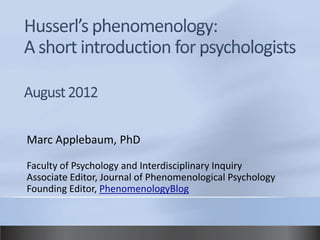
Husserl's phenomenology a short introduction for psychologists
- 1. Marc Applebaum, PhD Faculty of Psychology and Interdisciplinary Inquiry Associate Editor, Journal of Phenomenological Psychology Founding Editor, PhenomenologyBlog
- 2. Acknowledgment This presentation is deeply indebted to the many lectures of Amedeo Giorgi’s I have been fortunate to attend over the years…
- 3. An attitude of open expectancy Phenomenology is not simply an approach to philosophy, but more than that, as Giorgi has said, it is a way of seeing. This course is an introduction to this way of seeing, an invitation to what Gendlin (1982) might term a “felt sense” of phenomenology.
- 4. What is phenomenology? Introduction to some core concepts in Husserl’s phenomenological philosophy
- 5. Phainomenon + Logos Φαινόμενoν that which appears or is seen Λόγος a discourse or reasoned account
- 6. A provisional definition… Phenomenology is a practice of carefully describing and unfolding what is given to us in perception
- 7. Consciousness—our means of access to the world For phenomenology, consciousness is privileged because it is the medium through which anything whatsoever is known Consciousness is not “thing-like;” it is that by means of which we encounter the world and others
- 8. For phenomenology… The fundamental attribute of consciousness is that it presents Attention to lived perception is the foundation of phenomenological praxis
- 9. Perceptual presence Phenomenology offers a presentational theory of consciousness, not a representational theory For Husserl, we perceive the “things themselves,” not representations of things Of course, perception is fallible and always in the process of self-correcting…
- 10. “Intuition”—the presentational faculty of consciousness The German term for intuition, Anschauung, can also be translated as “perception” The Latin root of intuition is intueri, “looking upon” In philosophy this means that an object is present in perception for a subject
- 11. Intentionality For phenomenology, consciousness “reaches out” to an object—this quality of reaching out is called the intentionality of consciousness The Latin root of intend is intendere, “stretching out toward” This stretching out is a distinctive activity of consciousness…
- 12. Objects of consciousness Anything we can be conscious of is referred to as an “object of consciousness” We can distinguish between different types of objects-- For example, there are objects that transcend the conscious acts that grasp them And there are objects that are immanent in the conscious acts
- 13. Real and irreal objects Likewise phenomenology distinguishes between real and irreal objects— Real objects are located in space, time, and causality—like this table, Abraham Lincoln, or Chicago Irreal objects lack one or more of these attributes—a unicorn, a triangle, or the idea of justice
- 14. Real and irreal objects Though they are different kinds of objects, both are genuine objects for consciousness
- 15. The natural attitude The natural attitude is the way in which we encounter the world in everyday life—objects are assumed to be real and the world is assumed to be the way we grasp it… The natural attitude is usually not recognized as an attitude This is contrasted to chosen, reflective attitudes such as a scientific attitude
- 16. Facticity An object’s factual attributes are those that locate it in space, time, and causality Positivist philosophy seeks to ground science in only these attributes Phenomenology rejects reducing human phenomena to (only) their facticity Because this would imply viewing human phenomena as merely thing-like
- 17. To investigate a phenomenon, we adopt the attitude of the phenomenological reduction, which means— We bracket past knowledge of that phenomenon, and We withhold affirming existentially that that the phenomenon “is” as it appears, in order to carefully describe how it appears
- 18. The reduction-- Is a shift in attitude that frees the researcher from the natural attitude Reduction means returning something to a more primordial mode We set aside the facticity of the object, and describe it just as it appears to us, as a presence
- 19. In doing this we employ an epoché ἐποχή means suspending or “withholding from” We withhold from making the habitual existential affirmation regarding what we perceive By doing this, we become free to linger with and examine the perceptions themselves as presences instead of as facts
- 20. Review of methodical steps so far… 1. We employ the reduction and epoché, 2. We view the given as a phenomenal presence, 3. We next seek to identify the essential structure of the phenomenon using imaginative variation
- 21. Free imaginative variation We use our imagination to change any aspect of the phenomenon we’re examining, in order to discover what’s essential and what isn’t The test for what’s essential is: if we remove an essential constituent, the phenomenon is no longer be recognizable as itself—
- 22. This methodical varying--- Demonstrates that for phenomenology, possibilities are as important as facts Husserl didn’t claim to be inventing this technique, he was relying upon and clarifying something consciousness does all the time…
- 23. The psychological research method We will be working with the research method developed by Giorgi (2009) As you will see, the descriptive method closely follows Husserl’s methodical steps for phenomenological inquiry
- 24. Gendlin, E. T. (1978). Focusing. (first edition). New York: Everest House. Giorgi, A. (2009). The descriptive phenomenological method in psychology: A modified Husserlian approach. Pittsburgh: Duquesne University Press. Giorgi, A. (2000). Psychology as a human science revisited. Journal of Humanistic Psychology, 40 (3): 56- 73. Mohanty, J. N. (1987). Philosophical description and descriptive philosophy. In Phenomenology: Descriptive or hermeneutic? (pp. 40-61). The First Annual Symposium of the Simon Silverman Phenomenology Center, Duquesne University, Pittsburgh, PA.
